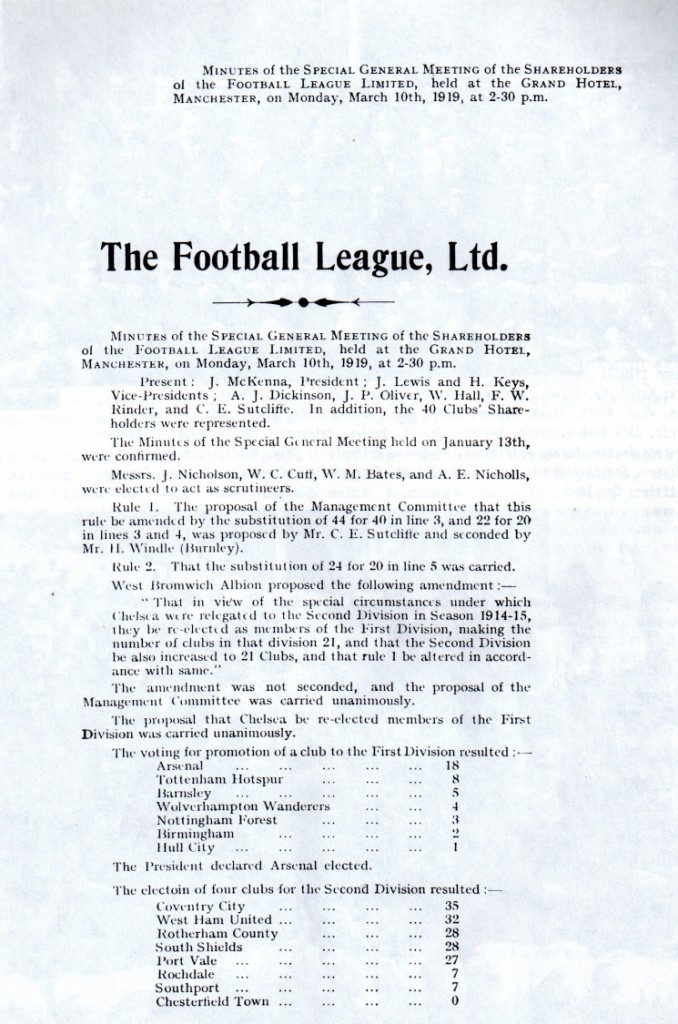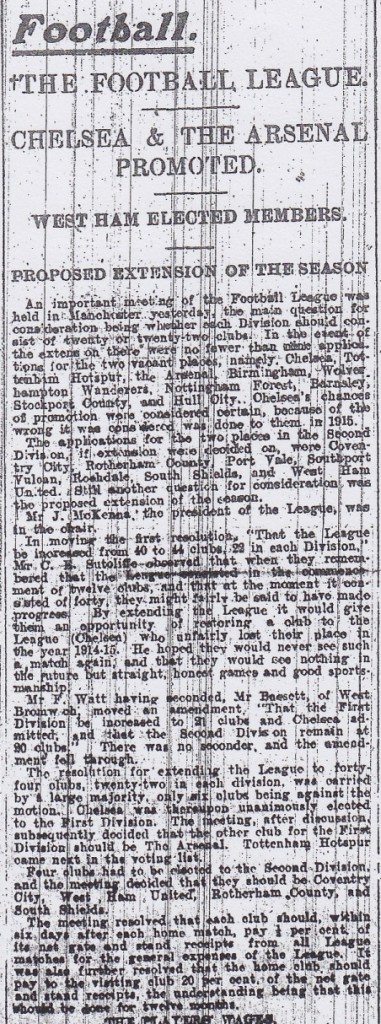By Tony Attwood
I have been re-telling the story of how Arsenal came to be in the first division in 1919 in celebration of 100 years in the top flight, knowing that many people, including some who claim to be Arsenal fans, will allege that the whole process was fixed.
I am hoping that the detailed evidence provided here will convince you that nothing was fixed and that the league had very good reasons to elect Arsenal ahead of the 1919/20 season. One key point is that this is all the evidence either way that my colleagues and I in the Arsenal History Society have been able to find. If there is any more, then it would be great if you could present it to us. But do remember most of the allegations of corruption appeared much later – and few had any hard evidence at all.
And so in our tale we come to 10 March at which all the members of the Football League met at the Grand Hotel Manchester to map out the post-war future of professional football in England. Sir Henry Norris was present representing Arsenal.
As Sally Davis (one of the very few people who has conducted a detailed review of Henry Norris’ life, and whose work is very helpfully on the internet) reported in her review of events “the decisions made that afternoon demonstrate several things about the Football League members: on a number of issues they had been influenced by the views expressed in Athletic News”, which we have mentioned in the last couple of posts. Also “the decisions of West Ham and South Shields to go out actively seeking votes did pay off; and the members had liked the method of sharing of gate money used by the London Combination, which had been West Ham’s idea.”
Of course first the clubs first had to agree formally to increase both the divisions to 22 clubs each: two extra places in Division One and two or more in Division Two (depending on how the Division One slots were filled). But even this was not that straightforward for a number of different proposals were put forward.
Everton for example proposed that the League should not be expanded but that Chelsea should stay in the First Division and Manchester United (the match fixers who avoided relegation by fixing the game with Liverpool) should be relegated. (That seemed to be doing their rivals Liverpool a real favour since logic and honour suggested that both Liverpool and Man U should have been thrown out of the League totally for allowing match fixing to develop, given that there were now three matches that were known about in the match fixing list. If you really want to find some bribery and corruption it might be worth searching the correspondence of Everton at this time).
But even relegation for the two guilty clubs was fiercely opposed not least because the clubs unified to blame the players, not the management. Their argument was carried because only representatives of the clubs were present, and everyone realised that if the board of directors were ever held responsible for the behaviour of their players, they could all be in trouble. (The footballers’ union was not invited to have a say in the matter.)
Thus generally what the clubs were doing was protecting themselves in the future: the idea was that if further match fixing allegations arose this precedent would mean that the clubs would not be to blame; it would always be the players and other employees. The directors effectively protected their own interests both at this moment in 1919 and (they hoped) forever more.
And by and large the ploy paid off, although it took Leeds City a roundabout route to make use of the situation a little later, largely because in their case the directors were most obviously to blame for their misdemeanours.
It was a decision that also caught Herbert Chapman in its net – as he was deemed to have been to blame for the illegal activities at Leeds during the war, even though he was not at the club at the time.
Thus in essence, the view of the League was clearly set out. Whatever went wrong, it was not the fault of the directors. Only their employees could screw up. Every director who had ever done anything underhand in football must have been sighing a deep sigh of relief and those who had a few tricky ideas up their sleeves would have felt they had just been delivered a huge additional Christmas present.
So with blame established West Bromwich Albion proposed that the First Division be expanded to 21 teams and that Chelsea should be elected as the 21st team. This was rejected as it meant one team not playing in each round of matches.
And so it was finally agreed that both divisions would be expanded to 22 teams. Then it was agreed that Preston and Derby would be promoted as the top two from the second division (as would have happened even without expansion) and it was then agreed unanimously that Chelsea should be elected to the First Division. That left one position available in the first division for another team and now it was noted that seven clubs had applied in advance for that final position, so it was obvious that a vote was needed.
Most of the applicants were as expected. Tottenham had finished bottom of the First Division in 1914-15. They wanted to keep their place. Barnsley, Wolverhampton, Birmingham City, Arsenal and Hull had finished 3rd to 7th in the Second Division and all applied. (Arsenal were listed as sixth, but in fact as the league table shows they were fifth on goal average). These clubs were joined in the ballot with the surprise entrant: Nottingham Forest who had finished 18th in the Second Division!
An open discussion then took place before the vote for the final place in the First Division was held. The results are shown in the minutes of the meeting below:
It has since been suggested in later reports that the Football League’s president made a speech supporting Arsenal. Other than secondary sources written some time later there is nothing to support this. The Sportsman, Athletic News, Daily Mirror and The Times all reported the matter the following day and none mentioned this. They did report that C.E. Sutcliffe made a speech stating that the expansion would give them an opportunity to do right by Chelsea. It would seem strange if another speech were made and somehow all the media failed to report it.
As we can see above, West Ham, Coventry City, Rotherham County and South Shields were also elected to the second division to make up the numbers.
The Athletic News reported that the Tottenham representative at the meeting stated “We shall take our defeat like sportsmen!” And in a sense they did, playing in Division II and immediately getting promotion back to the First Division after just one season.
So, we must now ask, if matters were dealt with in an orderly and proper fashion in the meeting, with Tottenham being very gentlemanly in accepting defeat and preparing their club (successfully it turns out) for one year in the second division, where on earth did all these stories about Arsenal bribing the chairmen come from? That question will be answered in the final episode.



The story is very interesting and clear enough to justify that Arsenal didn’t do anything wrong. Promoted on merit. Case Closed!
Yes, case closed indid.
But out of Topic.
With agent fee discussion appeared to be delaying the announcement of Nicholas Pepe as Arsenal player after he has successfully completed his medical at Arsenal’s London Colney today. But hopeful negotiations with his agent will reach a conclusion successfully to allow Pepe put pen to paper for Arsenal and announcement of Pepe arrival to the Emirates Stadium by Arsenal will be out soon.
But notwithstanding, Arsenal who will likely not play Pepe against Angers tomorrow evening at Stade Raymond Kopa when the Gunners lineup against them will beat them to avoid a 3 back to back pre-season match loss ahead of their playing at Camp Nou on Sunday away to Barcelona.
My AfC 4-2-3-1 formation starts and bench for the Angers match are as below.
Starts:
Leno;
Jenkinson Chambers Sokratis Kolasinac;
Xhaka Guendouzi;
Mkhitaryan Ozil Aubameyang;
Nkethia.
Bench:
Martinez Macey AMN Bielik Monreal Madley Willock Nelson Ceballos Burton Saka Martinellet John-Jules.
OT: ICC-2019
I think it is likely we will end this pseudo-cup in 3rd, after Benfica and ManU. If ManU can win their last game against Milan by more than 3 goals, they will win this pseudo-cup (I think). And no doubt, as 4th isn’t a trophy; neither will 3rd be a trophy.